|
De Duitse schrijver Georg Hermann (oorspronkelijk Georg Hermann Borchardt) werd op 7 oktober 1871 in Berlijn geboren. Zie ook alle tags voor Georg Hermann op dit blog.
Uit: Eine Zeit stirbt
„Doch das ist eine durchaus falsche Annahme gewesen. Weder blieb das Geld Geld. Noch die Ware Ware. Noch die Menschen Menschen. Der Staat hat nur die Zauberformel »Inflation« gemurmelt, hat nur seinen Zauberstab geschwungen: Hokus Pokus Trallala! Und alles ist anders geworden: das Geld ist kein Geld mehr. Die Ware Ersatzware. Und was aus den Menschen geworden ist, ist schwer zu sagen. Doch eines kann man mit Bestimmtheit feststellen: keine Menschen.
Genug davon. Nur soviel: die Siedlung hier ist damals, als man noch gar nicht ahnte, was werden würde, begonnen worden, und hat deshalb lange halbfertig gestanden, und ist endlich noch so gerade notdürftig aus allerhand unerprobten Surrogaten von Baumaterialien zusammengeleimt und unter Dach gebracht und dann ganz schnell bezogen worden.
Der Hauptvorzug dieser Ersatzstoffe besteht darin, daß sie durchweg vorzügliche Schalleiter sind.
Wenn z. B. jemand jetzt in der Nebenwohnung oder zwei Wohnungen weiter Klavier spielt und dazu singt, von der Oma ihrem kleinen Häuschen, das versoffen werden muß, oder wenn er auch nur seiner Frau ein Geheimnis anvertraut, hört man es fünfzehn Meter höher oder tiefer oder weiter, im Waschkeller und auf dem Trockenboden, im Schlafzimmer oder auf der Diele, genau so gut wie im Kleinviehstall. Jedes Ei, das dort gelegt wird, erleben alle Parteien ringsum. Und all das hört man dank der Vorzüglichkeit der neuen Baustoffe fast noch deutlicher und reiner und ohne Nebengeräusche als an Ort und Stelle selbst.
Die anderen Eigenschaften dieser Bausurrogate sind jedoch weniger angenehm. Sie machen es z. B., daß im Spätherbst und mehr noch im Vorfrühling die Wände schwitzen, als hätten sie Aspirin genommen. Daß im Winter kein Ofen, ganz gleich welcher Konstruktion, je ein Zimmer warm und mollig kriegt.“
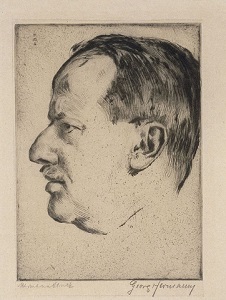
Georg Hermann (7 oktober 1871 - 19 november 1943)
Portret doorHermann Struck, ca. 1920 – 1930
De Amerikaanse dichter en schrijver James Whitcomb Riley werd geboren op 7 oktober 1849 in Greenfield, Indiana. Zie ook mijn blog van 7 oktober 2010 en eveneens alle tags voor James Whitcomb Riley op dit blog.
Pan
This Pan is but an idle god, I guess,
Since all the fair midsummer of my dreams
He loiters listlessly by woody streams,
Soaking the lush glooms up with laziness;
Or drowsing while the maiden-winds caress
Him prankishly, and powder him with gleams
Of sifted sunshine. And he ever seems
Drugged with a joy unutterable-- unless
His low pipes whistle hints of it far out
Across the ripples to the dragon-fly
That like a wind-born blossom blown about,
Drops quiveringly down, as though to die--
Then lifts and wavers on, as if in doubt
Whether to fan his wings or fly without.
The Boy Lives On Our Farm
The boy lives on our Farm, he's not
Afeard o' horses none!
An' he can make 'em lope, er trot,
Er rack, er pace, er run.
Sometimes he drives two horses, when
He comes to town an' brings
A wagon-full o' 'taters nen,
An' roastin'-ears an' things.
Two horses is 'a team,' he says,
An' when you drive er hitch,
The right-un's a 'near-horse,' I guess
Er 'off'--I don't know which--
The Boy lives on our Farm, he told
Me, too, 'at he can see,
By lookin' at their teeth, how old
A horse is, to a T!
I'd be the gladdest boy alive
Ef I knowed much as that,
An' could stand up like him an' drive,
An' ist push back my hat,
Like he comes skallyhootin' through
Our alley, with one arm
A-wavin' Fare-ye-well! to you--
The Boy lives on our Farm!
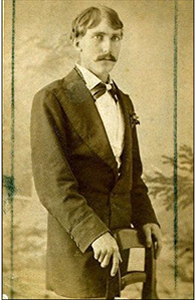
James Whitcomb Riley (7 oktober 1849 – 22 juli 1916)
Rond zijn 25e jaar
De Duitse, romantische dichter Wilhelm Müller werd geboren op 7 oktober 1794 in Dessau. Zie ook mijn blog van 7 oktober 2010 en eveneens alle tags voor Wilhelm Müller op dit blog.
Der stürmische Morgen
Wie hat der Sturm zerrissen
Des Himmels graues Kleid!
Die Wolkenfetzen flattern
Umher in mattem Streit.
Und rote Feuerflammen
Ziehn zwischen ihnen hin:
Das nenn ich einen Morgen
So recht nach meinem Sinn!
Mein Herz sieht an dem Himmel
Gemalt sein eignes Bild -
Es ist nichts als der Winter,
Der Winter kalt und wild!
Einsamkeit
Wie eine trübe Wolke
Durch heitre Lüfte geht,
Wenn in der Tanne Wipfel
Ein mattes Lüftchen weht:
So zieh' ich meine Straße
Dahin mit trägem Fuß,
Durch helles, frohes Leben
Einsam und ohne Gruß.
Ach, daß die Luft so ruhig!
Ach, daß die Welt so licht!
Als noch die Stürme tobten,
War ich so elend nicht.
Rast
Nun merk' ich erst, wie müd ich bin,
Da ich zur Ruh' mich lege;
Das Wandern hielt mich munter hin
Auf unwirthbarem Wege.
Die Füße frugen nicht nach Rast,
Es war zu kalt zum Stehen,
Der Rücken fühlte keine Last,
Der Sturm half fort mich wehen.
In eines Köhlers engem Haus
Hab' Obdach ich gefunden;
Doch meine Glieder ruhn nicht aus:
So brennen ihre Wunden.
Auch du, mein Herz, in Kampf und Sturm
So wild und so verwegen,
Fühlst in der Still' erst deinen Wurm
Mit heißem Stich sich regen!
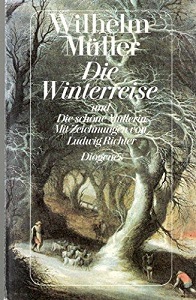
Wilhelm Müller (7 oktober 1794 – 1 oktober 1827)
Cover
De Iraanse dichter en schilder Sohrab Sepehri werd geboren op 7 oktober 1928 in Kashan. Zie ook alle tags voor Sohrab Sepehri op dit blog.
Oasis In A Moment
If you are coming to me,
I am beyond Oblivion.
Beyond Oblivion is a place
Where dandelions run into the veins of air,
Bringing news of a faraway blooming bush.
The sands bear the footprints of delicate horsemen
Mounting the hilltop of poppies.
Beyond Oblivion, the umbrella of desire is open.
As soon as thirst blows onto the root of a leaf
Rain sings songs of freshness.
One is lonely here.
Where an elm's shadow streams into eternity.
If you are coming to me
Approach gently, softly lest you crack
The fragile china of my solitude!
Vertaald door Ismail Salami
I don't know
I don't know why they say
the horse is a noble animal
and the dove is beautiful
and why no one keeps a vulture.
Why is the clover inferior to the red tulip?
We need to wash our eyes
and view things differently.
We should wash our words
Words should be wind
Words should be rain
We should close the umbrellas
And walk in the rain.
Vertaald door Pontia Fallahi
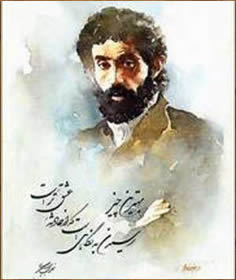
Sohrab Sepehri (7 oktober 1928 - 21 april 1980)
Onafhankelijk van geboortedata
De Nigeriaanse schrijver Chigozie Obioma werd geboren in 1986 in Akure. Zie ook alle tags voor Chigozie Obioma op dit blog.
Uit: The Fishermen
“This word, once pronounced, often completed the message. He brought out two twenty-naira notes from the breast pocket of his coat and dropped them on our study table.
“For both of you,” he said, and left the room.
Obembe and I were still sitting in our bed trying to make sense of all that when we heard Mother speaking to him outside the house in a voice so loud it seemed he was already far away.
“Eme, remember you have growing boys back here,” she’d said.
“I’m telling you, oh.”
She was still speaking when Father started his Peugeot 504. At the sound of it, Obembe and I hurried from our room, but Father was already driving out of the gate. He was gone.
Whenever I think of our story, how that morning would mark the last time we’d live together, all of us, as the family we’d always been, I begin—even these two decades later—to wish he hadn’t left, that he had never received that transfer letter. Before that letter came, everything was in place: Father went to work every morning and Mother, who ran a fresh food store in the open market, tended to my five siblings and me who, like the children of most families in Akure, went to school. Everything followed its natural course. We gave little thought to past events. Time meant nothing back then.
The days came with clouds hanging in the sky filled with cupfuls of dust in the dry seasons, and the sun lasting into the night. It was as if a hand drew hazy pictures in the sky during the rainy seasons, when rain fell in deluges pulsating with spasms of thunderstorms for six uninterrupted months. Because things followed this known and structured pattern, no day was worthy of remembrance. All that mattered was the present and the foreseeable future.“
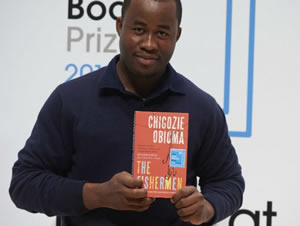
Chigozie Obioma (Akure, 1986)
|



